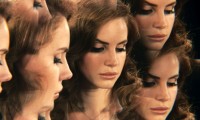Naturally Seven, “Feel It (In The Air)” (2007)
As the lead singer of this a cappella group from New York belts out the first verse of Phil Collins’ 1981 hit, “In the Air Tonight,” passengers on this Paris metro must assume that a bunch of rowdy youths are on their way back from the Champs-Élysées to their towers in the suburbs.
But no… The singing is too good; it’s in English. And though these guys may be wearing the familiar “homeboy” gear, they show too much unabashed intensity to be French. This is not native insolence, it’s the naïve assurance of elsewhere. These have to be Americans, clearly professionals, and cameras are rolling: The whole event has no doubt been contrived for the sake of publicity.
And yet the fact that it’s a promotional stunt does little to diminish the authenticity of the interactions between the various players in this scene. Every time I watch this clip I feel happy, almost moved. I love how the atmosphere softens as commuters gradually submit to what is happening, and how the singers of the Naturally 7 grow emboldened as they feel themselves appreciated. They begin to delight in the sound of their own voices; that delight spreads through the car. People turn to watch, they smile (it’s almost impossible not to). The woman with the leopard scarf bobs her head, the French Everywoman in the black coat dances ineptly; others pull out their cameras, suddenly realizing that something special is going on.
Then there’s the iPod Man, conspicuous exception to all this. Singing be damned, he will not be imposed upon, will not have his personal orthodoxy challenged. Fair enough, we’re in the subway, sidewalk stilled and pushed underground, and in such close quarters we expect strict decorum: no staring, no bum or crotch contact, and of course, no excessive noise. Ideal space for provocation, peddling and spectacle, and admittedly, Parisians have their metro invaded every five minutes by beggars declaiming tales of woe or by musicians whose faces tell of similar woe. Such is one’s right to just pretend it isn’t there.
But it seems awfully stubborn for the iPod Man to exercise his right when it’s so obvious this is not a routine subway intervention. Notice, by the end, he has given up on his crossword and let a smile creep into his lips. I can’t help but feel there is a gentle collision of cultures at play, and the iPod Man, by virtue of his refusal to partake, helps bring that collision into focus.
Although as a nation France has fallen from the dizzy heights of two centuries ago, in the heart of its people it remains “la lumiere du monde” (to use the words of Charles de Gaulle)—the polestar against which all other cultures should be gauged. And so even today the French find it galling that the Anglo-American pop mainstream has become the world’s “official culture,” hovering like a great monolith, casting its dominating shadow over what’s left of their higher, more refined civilization.
The Naturally 7 express all the blithe pride and charming insensibility of that American dominance. They are products of the America that defines you by what you can perform and what you can get, rather than by where you come from and what papers you hold. They are quite naturally certain the sheer brilliance of their “vocal play” will crush any objections, and it does.
A little cliché perhaps, but that’s one of the back-stories I see framing this scene: Parisians going about their hapless business — preserving millennial heritage, debating old questions, critiquing new improprieties, and just generally harrumphing in dispassionate indignation — while ingenuous Americans come and use their vestigial city as a playground.
– Erik Rutherford







